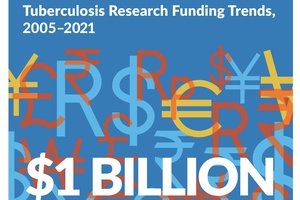Worldwide TB R&D funding surpasses US$1 billion, but falls short of goals
A report highlights that despite reaching US$1 billion in spending in 2021, funding for TB R&D is a mere fraction of what’s needed to achieve UN sustainable development goal of ending TB as a pandemic by 2030.
New York | December 6, 2022 – For the first time in history, funding for tuberculosis (TB) research and development (R&D) hit a billion dollars worldwide in 2021. This marked a significant milestone that nonetheless falls significantly short of what’s needed to stay on track to end TB, according to a new report released today by Treatment Action Group (TAG) and the Stop TB Partnership.
The report
Tuberculosis Research Funding Trends, 2005–2021
highlights that despite reaching US$1 billion in spending,
funding for TB R&D is a mere fraction of what’s needed
to achieve the United Nations sustainable development goal of
ending TB as a pandemic by 2030. Every day, 4400 people continue
to die from TB, a treatable and curable airborne infectious
disease.
“We're proud that two decades of
activism and scientific advances have led to this unprecedented
level of funding for TB research," said TAG Executive Director
Mark Harrington, "but we remain disappointed at the pandemic
inequity that holds back progress on TB diagnosis, prevention,
and treatment. This number must grow to US$5 billion per
year."
To meet the 2030 deadline, governments and
duty bearers must commit more resources to the fight. The United
Nations High-Level Meeting on TB in 2018 set the target of US$2
billion per annum for R&D. After years of chronic
underinvestment and devastating disruptions caused by COVID-19,
the Stop TB Partnership’s
Global Plan to End TB, 2023–2030
estimates the funding need for TB R&D to have gone up to
US$5 billion per annum.
“I don’t want to
celebrate anything. We have reached US$1 billion, but this is
far from what is needed to make a serious difference without the
US$5 billion annually as outlined in the Global Plan to End TB,
2023–2030,” said Dr. Lucica Ditiu, Executive
Director of the Stop TB Partnership. “We should put
fundraising efforts in motion and identify smart financing
approaches to advance research, develop point-of-care diagnosis,
deliver shorter treatments, and get a new TB vaccine by the end
of 2025.”
The report reveals that TB R&D
funding increases in 2021 were driven mostly by investments in
operational and epidemiology research and in diagnostics
development. Seventy percent of TB R&D funding came from
public entities, with the U.S. National Institutes of Health
providing the largest single allocation at US$354 million.
However, none of the G7 countries have met their fair share
target (defined as 0.1% of overall R&D spending going toward
TB research,) with only three countries surveyed—Ireland,
the Philippines and South Africa—meeting this benchmark.
Philanthropic spending reached US$140 million worldwide, with
81% coming from the Gates Foundation. Private sector funding
lagged at US$102 million, well below its peak of US$145 million
a decade ago.
Concerningly, a mere 12 percent of
overall spending was on TB vaccines. Without new vaccines
against TB, the epidemic will not be stopped. Developing and
delivering new TB vaccines in the next decade is within
grasp—on the precondition that adequate financing for
research is made available without delay.
The
billions needed to mount a robust global TB response exceed
what’s been invested in TB to date, but they're little
more than a rounding error compared to investments made on
SARS-CoV-2 R&D in the past three years. “TB is an
airborne disease. That means if I’m at risk, you’re
at risk,” said Stephen Anguva Shikoli, the National
Coordinator of the Kenya Network of TB Champions and Director of
Pamoja TB Group. “If we have new innovations, if we have
new tools, if we have [a] new vaccine, we will be able to reduce
delays in diagnosis and TB deaths around the world."
#
# #
About Treatment Action Group
Treatment Action Group (TAG) is an independent, activist,
and community-based research and policy think tank committed to
racial, gender, and LGBTQ+ equity; social justice; and
liberation, fighting to end HIV, tuberculosis (TB), and
hepatitis C virus (HCV). TAG catalyzes open collective action by
affected communities, scientists, and policymakers to ensure
that all people living with or impacted by HIV, TB, or HCV
– especially communities of color and other marginalized
communities experiencing inequities – receive life-saving
prevention, diagnosis, treatment, care, and information. We are
science-based activists working to expand and accelerate vital
research and effective community engagement with research and
policy institutions for an end to the HIV, TB, and HCV
pandemics.
About Stop TB Partnership
The Stop TB Partnership is a unique United Nations
hosted entity based in Geneva, Switzerland, committed to
revolutionizing tuberculosis (TB) space to end the disease by
2030. The organization aligns more than 2,000 partners worldwide
to promote cross-sectoral collaboration. The Stop TB
Partnership’s various teams and initiatives take bold and
smart risks to identify, fund and support innovative approaches,
ideas, and solutions to ensure the TB community has a voice at
the highest political levels and that all TB-affected people
have access to affordable, quality, and people-centered care.
Source: Stop TB Partnership


